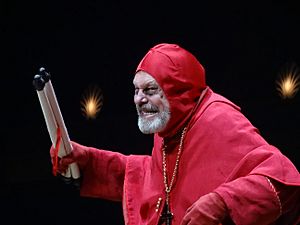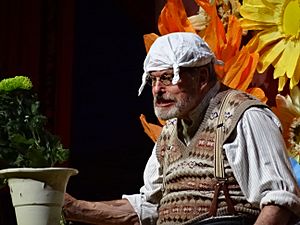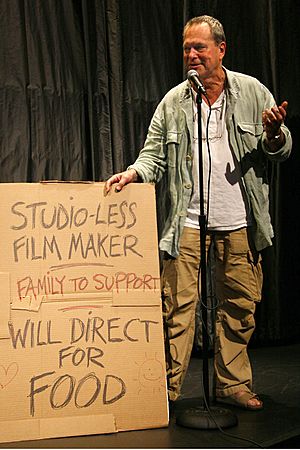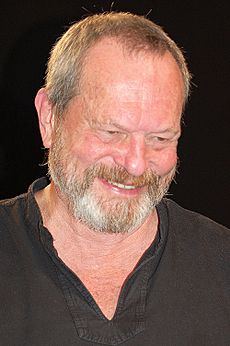Terry Gilliam facts for kids
Quick facts for kids
Terry Gilliam
|
|
|---|---|
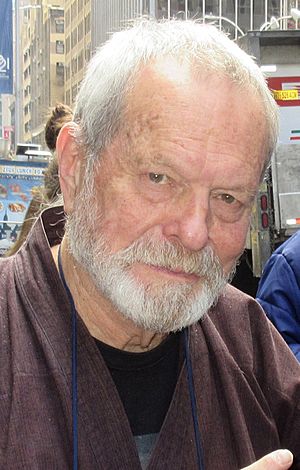
Gilliam in 2019
|
|
| Born | 22 November 1940 |
| Citizenship |
|
| Education | Birmingham High School |
| Alma mater | Occidental College (BA) |
| Occupation |
|
| Years active | 1968–present |
| Spouse(s) |
Maggie Weston
(m. 1973) |
| Children | 3 |
Terrence Vance Gilliam (/ˈɡɪliəm/ gil-EE-əm; born 22 November 1940) is a talented American-British filmmaker, comedian, and animator. He became famous as a member of the hilarious comedy group Monty Python. He worked alongside John Cleese, Eric Idle, Michael Palin, Terry Jones, and Graham Chapman.
Together, they created the popular sketch comedy show Monty Python's Flying Circus (1969–1974). They also made classic films like Monty Python and the Holy Grail (1975), Life of Brian (1979), and The Meaning of Life (1983). In 1988, the group won a BAFTA Award for their amazing contribution to British cinema. Gilliam himself received the BAFTA Fellowship in 2009 for his lifetime achievements.
Gilliam later became known for directing serious films. His movies often explore themes of imagination and standing up against strict rules or unfair power. Many of his films are set in unusual, sometimes dark, worlds. They often mix humor with sad or serious moments. He has directed thirteen feature films. Some of his most praised works include Time Bandits (1981), Brazil (1985), The Adventures of Baron Munchausen (1988), The Fisher King (1991), and 12 Monkeys (1995).
He started his career as an animator and cartoonist. He joined Monty Python to create their unique animated sequences. Eventually, he became a full member, also taking on acting roles. Gilliam was the only Monty Python member not born in Britain. He became a British citizen in 1968.
Contents
Early Life and Education
Terry Gilliam was born on 22 November 1940 in Minneapolis, Minnesota, USA. His father was a traveling salesman who later became a carpenter. The family moved to nearby Medicine Lake, Minnesota, and then to Panorama City, Los Angeles, in 1952.
Gilliam went to Birmingham High School. During his high school years, he loved reading Mad magazine. This magazine, edited by Harvey Kurtzman, greatly influenced Gilliam's later creative work. He graduated from Occidental College in 1962 with a degree in political science.
Career Highlights
Early Animation Work
Gilliam began his career as an animator and cartoonist. One of his early comic strips for the US magazine Help! even featured John Cleese, who would later become his Monty Python colleague. When Help! magazine closed, Gilliam moved to Europe.
He settled in England and created animated parts for the children's TV series Do Not Adjust Your Set from 1968 to 1969. This show also featured Eric Idle, Terry Jones, and Michael Palin, who would all become part of Monty Python.
Joining Monty Python
Gilliam was a key part of Monty Python's Flying Circus from the very beginning. At first, he was credited mainly as the animator. Later, he became a full member of the group. His unique cartoons connected the show's sketches. They also shaped the group's visual style for their albums and books.
His animations combine his own drawings with backgrounds and moving cutouts from old photographs. Many of these photos came from the Victorian era.
Gilliam also appeared in several sketches, though he usually had smaller roles. He often played characters that required a lot of makeup or uncomfortable costumes. A famous recurring character was a knight in armor who would end sketches by hitting other characters with a plucked chicken. He also designed the covers for most of the Monty Python albums.
Directing Films
In 1975, Gilliam started directing films. He co-directed Monty Python and the Holy Grail with Terry Jones. Gilliam was in charge of the camera work and also acted in the film. This was the only Python film he directed, but he continued to act in their later movies.
As Monty Python took more breaks, Gilliam began his solo filmmaking career. In 1977, he directed his first film outside the group, Jabberwocky. This was a comedy set in the Middle Ages and starred Python member Michael Palin.
In 1981, Gilliam directed Time Bandits. He also directed the short film The Crimson Permanent Assurance, which played before Monty Python's The Meaning of Life. After this, Monty Python mostly stopped working together, and Gilliam focused on his directing career.
The "Trilogy of Imagination"
Gilliam created a series of three films he called the "Trilogy of Imagination." These films explore different "ages of man." They are Time Bandits (1981), Brazil (1985), and The Adventures of Baron Munchausen (1988). All three movies are about the strange rules of society and the desire to escape them using imagination.
Time Bandits shows this struggle through the eyes of a child. Brazil explores it through a man in his thirties. Munchausen tells the story through an elderly man's perspective.
Americana Trilogy
In the 1990s, Gilliam directed another group of films, sometimes called the "Americana Trilogy." These movies were set in North America. While still unique, they had fewer fantastical elements than his earlier films. This trilogy includes The Fisher King (1991), 12 Monkeys (1995), and Fear and Loathing in Las Vegas (1998).
Later Projects
In 1999, Gilliam tried to make a film called The Man Who Killed Don Quixote. It had a large budget, but filming faced many problems. The main actor got hurt, and a flood damaged the set. The film was canceled, but a documentary called Lost in La Mancha (2002) was made about the difficult production.
After this, J. K. Rowling, the author of the Harry Potter books, wanted Gilliam to direct Harry Potter and the Philosopher's Stone. However, Warner Bros. chose another director.
In 2002, Gilliam directed a series of popular TV commercials for Nike. These ads, called "Secret Tournament", featured famous football players in a hidden tournament inside a giant ship.
In 2005, Gilliam released two films: The Brothers Grimm and Tideland. In 2006, he directed a stage show called Slava's Diabolo, combining clown artistry with his unique visual style.
In 2007, Gilliam began working on The Imaginarium of Doctor Parnassus. Production faced a major challenge when actor Heath Ledger passed away in 2008. However, Johnny Depp, Jude Law, and Colin Farrell stepped in to help finish Ledger's role. The film was successfully completed and released in 2009. It earned over $60 million worldwide and received two Academy Award nominations.
Recent Work
In 2011, Gilliam made his opera directing debut with The Damnation of Faust in London. This production later moved to Belgium and received great reviews.
In 2012, Gilliam announced a new film project, The Zero Theorem, starring Christoph Waltz. The film premiered at the 70th Venice International Film Festival in 2013.
After many attempts, Gilliam finally completed The Man Who Killed Don Quixote. Filming began in 2017 with Adam Driver and Jonathan Pryce. The film premiered at the 2018 Cannes Film Festival in 2018 and was released in French theaters the same day.
In 2022, his production of Into the Woods, which he co-directed, opened to positive reviews. As of 2025, Gilliam has announced a new film called Carnival: At the End of Days. It is expected to star Johnny Depp, Jeff Bridges, Adam Driver, and Jason Momoa.
Other Creative Projects
Beyond directing his own films, Gilliam has also been involved in other creative projects. In 2010, he was a "creative advisor" for an animated film called 1884, a steampunk parody. In 2013, he was an executive producer for The White Circus, a dark fairy tale adventure.
He also explored the idea of releasing his 1970s animation templates as digital files for others to use. This project, related to his 1978 book Animations of Mortality, aimed to share his unique visual style with a wider audience.
Personal Life
Terry Gilliam has been married to British makeup artist Maggie Weston since 1973. Maggie worked on many Monty Python projects and Gilliam's early films. They have three children: Amy Rainbow (born 1978), Holly Dubois (born 1980), and Harry Thunder (born 1988). All of their children have also worked on or appeared in some of his films.
Gilliam became a British citizen in 1968. He held dual American and British citizenship for 38 years. In 2006, he gave up his American citizenship. He explained this was partly a protest against the US government at the time. He also mentioned concerns about future taxes for his family.
He has a home in Italy, near the border of Umbria and Tuscany. He helped start the annual Umbria Film Festival in the nearby town of Montone. Gilliam also lives in Highgate, London.
Charitable Work
Gilliam has supported several charitable causes. In 2009, he joined the board of Videre Est Credere, a UK human rights charity. This organization helps local activists record video evidence of human rights violations. The footage is then checked and shared to help bring about change. He works with others like movie producer Uri Fruchtmann and music producer Brian Eno on this charity.
Filmography
| Year | Title | Distributor |
|---|---|---|
| 1975 | Monty Python and the Holy Grail | EMI Films / Cinema 5 |
| 1977 | Jabberwocky | Columbia Pictures / Warner Bros. |
| 1981 | Time Bandits | Embassy Pictures |
| 1985 | Brazil | Universal Pictures / 20th Century Fox |
| 1988 | The Adventures of Baron Munchausen | Columbia Pictures |
| 1991 | The Fisher King | TriStar Pictures |
| 1995 | 12 Monkeys | Universal Pictures |
| 1998 | Fear and Loathing in Las Vegas | |
| 2005 | The Brothers Grimm | Dimension Films |
| Tideland | Revolver Entertainment / ThinkFilm | |
| 2009 | The Imaginarium of Doctor Parnassus | Lionsgate UK |
| 2013 | The Zero Theorem | Stage 6 Films |
| 2018 | The Man Who Killed Don Quixote | Sparky Pictures |
Awards and Achievements
Terry Gilliam's films have received many awards and nominations. Here are some of the major ones:
| Year | Title | Academy Awards | BAFTA Awards | Golden Globe Awards | |||
|---|---|---|---|---|---|---|---|
| Nominations | Wins | Nominations | Wins | Nominations | Wins | ||
| 1983 | Monty Python's The Meaning of Life | 1 | |||||
| 1985 | Brazil | 2 | 2 | 2 | |||
| 1988 | The Adventures of Baron Munchausen | 4 | 4 | 3 | |||
| 1991 | The Fisher King | 5 | 1 | 2 | 5 | 2 | |
| 1995 | 12 Monkeys | 2 | 1 | 1 | |||
| 2009 | The Imaginarium of Doctor Parnassus | 2 | 2 | ||||
| Total | 15 | 1 | 11 | 5 | 6 | 3 | |
Actors Winning Awards Under Gilliam's Direction
Actors working with Terry Gilliam have also received important awards.
| Year | Performer | Film | Result |
|---|---|---|---|
| Academy Award for Best Actor | |||
| 1991 | Robin Williams | The Fisher King | Nominated |
| Academy Award for Best Supporting Actor | |||
| 1995 | Brad Pitt | 12 Monkeys | Nominated |
| Academy Award for Best Supporting Actress | |||
| 1991 | Mercedes Ruehl | The Fisher King | Won |
See also
 In Spanish: Terry Gilliam para niños
In Spanish: Terry Gilliam para niños
 | Sharif Bey |
 | Hale Woodruff |
 | Richmond Barthé |
 | Purvis Young |


